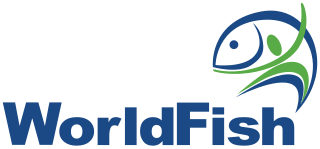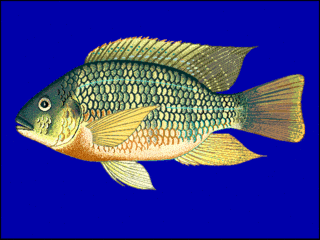Aquaculture, also known as aquafarming, is the controlled cultivation ("farming") of aquatic organisms such as fish, crustaceans, mollusks, algae and other organisms of value such as aquatic plants. Aquaculture involves cultivating freshwater, brackish water, and saltwater populations under controlled or semi-natural conditions and can be contrasted with commercial fishing, which is the harvesting of wild fish. Aquaculture is also a practice used for restoring and rehabilitating marine and freshwater ecosystems. Mariculture, commonly known as marine farming, is aquaculture in seawater habitats and lagoons, as opposed to freshwater aquaculture. Pisciculture is a type of aquaculture that consists of fish farming to obtain fish products as food.

Fish farming or pisciculture involves commercial breeding of fish, most often for food, in fish tanks or artificial enclosures such as fish ponds. It is a particular type of aquaculture, which is the controlled cultivation and harvesting of aquatic animals such as fish, crustaceans, molluscs and so on, in natural or pseudo-natural environments. A facility that releases juvenile fish into the wild for recreational fishing or to supplement a species' natural numbers is generally referred to as a fish hatchery. Worldwide, the most important fish species produced in fish farming are carp, catfish, salmon and tilapia.

The European eel is a species of eel. Their life history was a mystery for thousands of years, and mating in the wild has not yet been observed. The five stages of their development were originally thought to be different species. They are critically endangered due to hydroelectric dams, overfishing by fisheries on coasts for human consumption, and parasites.

The International Center for Living Aquatic Resources Management (ICLARM), also known as WorldFish, is an international organization working to transform aquatic food systems to reduce hunger, malnutrition, and poverty.

Aquaponics is a food production system that couples aquaculture with hydroponics whereby the nutrient-rich aquaculture water is fed to hydroponically grown plants.

Tilapia has become the third most important fish in aquaculture after carp and salmon; worldwide production exceeded 1.5 million metric tons in 2002 and increases annually. Because of their high protein content, large size, rapid growth, and palatability, a number of coptodonine and oreochromine cichlids—specifically, various species of Coptodon, Oreochromis, and Sarotherodon—are the focus of major aquaculture efforts.

The University of the Philippines Visayas is a public research university in Iloilo, Philippines. A constituent university of the University of the Philippines system, it teaches management, accountancy, marketing, economics, chemistry, applied mathematics and physics, marine science education and research, fisheries, and aquaculture. It offers regional studies programs on the preservation and enrichment of the Visayan cultural heritage.

Integrated multi-trophic aquaculture (IMTA) is a type of aquaculture where the byproducts, including waste, from one aquatic species are used as inputs for another. Farmers combine fed aquaculture with inorganic extractive and organic extractive aquaculture to create balanced systems for environment remediation (biomitigation), economic stability and social acceptability.
Chennai is home to many educational and research institutions. IIT Madras, located in South Chennai is considered as the premier centre of engineering education in India. Anna University and the University of Madras are the oldest state owned universities which are ranked among the best universities in India. The College of Engineering, Guindy and Madras Institute of Technology, which are the constituent college of Anna University along with Alagappa College of Technology are the pioneer institutes of engineering education in India. Some of the oldest medical colleges India, the Madras Medical College (1835) and Stanley Medical College (1938) are located in the city. Notable, liberal arts colleges in the city include Loyola College, Madras Christian College, Presidency College, Stella Maris College, Women's Christian College and Ethiraj College for Women.

Fishing in India is a major sector within the economy of India contributing 1.07% of its total GDP. The fishing sector in India supports the livelihood of over 28 million people in the country, especially within the marginalized and vulnerable communities. India is the third largest fish producing country in the world accounting for 7.96% of the global production and second largest producer of fish through aquaculture, after China. The total fish production during the FY 2020-21 is estimated at 14.73 million metric tonnes. According to the National Fisheries Development Board the Fisheries Industry generates an export earnings of Rs 334.41 billion. Centrally sponsored schemes will increase exports by Rs 1 lakh crore in FY25. 65,000 fishermen have been trained under these schemes from 2017 to 2020. Freshwater fishing consists of 55% of total fish production.
The Marine Institute is a state agency in Ireland that provides government, public agencies and the maritime industry with scientific, advisory and economic development services, aiming to inform policy-making, regulation and the sustainable management and growth of the country's marine resources. Founded in 1991 on foot of a 1974 report, the institute undertakes and promotes marine research and development. The agency's staff and operations are governed by a ministerially-appointed board. Based at its headquarters near Galway, it has an office in Dublin and two research vessels.

The Virginia Institute of Marine Science (VIMS) is one of the largest marine research and education centers in the United States. Founded in 1940, VIMS is unique among marine science institutions in its legal mandate to provide research, education, and advisory services to government, citizens, and industry. Funding for VIMS comes from the Commonwealth of Virginia, grants and contracts from federal and state agencies, and private giving. The School of Marine Science (SMS) at VIMS is the graduate school in marine science for the College of William & Mary. VIMS offers M.S., Ph.D., and professional M.A. degrees in marine science. The school has 52 faculty members, an enrollment of 80-100 students, and includes 4 academic departments. VIMS' main campus is located in Gloucester Point, Virginia.

The Central Institute of Fisheries Education (CIFE) is a Deemed to be a University and institution of higher learning for fisheries science in Mumbai, India. CIFE has over four decades of leadership in human resource development with its alumni aiding in the development of fisheries and aquaculture worldwide, producing notable contributions to research and technological advancements to their credit. It was ranked 9th in India by the National Institutional Ranking Framework in the agriculture and allied sectors ranking for 2024.

The Institute for Marine and Antarctic Studies (IMAS) is a teaching and research institute of the University of Tasmania in Hobart, Tasmania. IMAS was established in 2010, building upon the university's partnership with CSIRO Oceans and Atmosphere and the Australian Antarctic Division in cooperative Antarctic research and Southern Ocean research.

The Lake Victoria Fisheries Organization (LVFO) is an institution under the East African Community, with the aim to harmonise, develop and adopt conservation and management measures for the sustainable utilisation of living resources of Lake Victoria, and to optimise socio-economic benefits from the basin for the partner states; Kenya, Tanzania, Burundi, and Uganda. The LVFO headquarters are in Jinja, Uganda. LVFO collaborates closely with the national fisheries research institutes in the three partner states.
Aquaculture in Madagascar started to take off in the 1980s. The industry includes the cultivation of sea cucumbers, seaweed, fish and shrimp and is being used to stimulate the country's economy, increase the wages of fishermen and women, and improve the regions ocean water quality. Coastal regions of Madagascar are reliant on the Indian Ocean's marine resources as a source of food, income, and cultural identity.
Central Institute of Brackishwater Aquaculture (CIBA) is one of the research institutes under Indian Council of Agricultural Research (ICAR), New Delhi to serve as the nodal agency for catering to the needs of the brackishwater aquaculture research in India. The institute is headquartered at Santhome High Road, Raja Annamalai Puram, Chennai with a research centre at Kakdwip in West Bengal and an experimental field station at Muttukadu, roughly 30 km to the south of Chennai. The institute works under the Ministry of Agriculture, India.

Mudnakudu Channabasappa Nandeesha was a development researcher, innovative aquaculture development worker and educator. He is recognized for making critical contributions to the rapid growth of aquaculture by applying research to key bottlenecks to fish production. In India, he conducted successful pioneering field tests of Ovaprim, an ovulating agent, under different agro-climatic conditions to help remove a critical early barrier for freshwater fish breeding. His significant scientific contributions include simplified breeding technology for cyprinids and development of feeds and feeding techniques appropriate to rural aquaculture, and helping improve and spread the practices of small scale fish farming at a time when most attention was on large scale producers. He wrote a regular and widely acclaimed column in Network of Aquaculture Centers in Asia-Pacific (NACA) Aquaculture Asia magazine on farmer innovations in aquaculture. He was described as an "ambassador for aquaculture" and was especially noted for promoting aquaculture for the disadvantaged poor households and women. Along with Michael New, in 2003 he was a founding member of the not-for-profit organisation, Aquaculture without Frontiers. While encouraging poor people to take up aquaculture, he was also a pioneer in promoting equity for women, who had been neglected in the aquaculture boom. Throughout his career, he was in the forefront of initiatives to upgrade the professionalism of fisheries and aquaculture experts, and inspired peers and students in critical new directions.

The Network of Aquaculture Centres in Asia-Pacific (NACA) was formed by International treaty titled Agreement on the Network of Aquaculture Centres in Asia and the Pacific signed in Bangkok on 8 January 1988.

The Lilongwe University of Agriculture and Natural Resources (LUANAR) is a university outside Lilongwe, Malawi. It was formed in 2011 by a merger between Bunda College of Agriculture of the University of Malawi and Natural Resources College (NRC).















